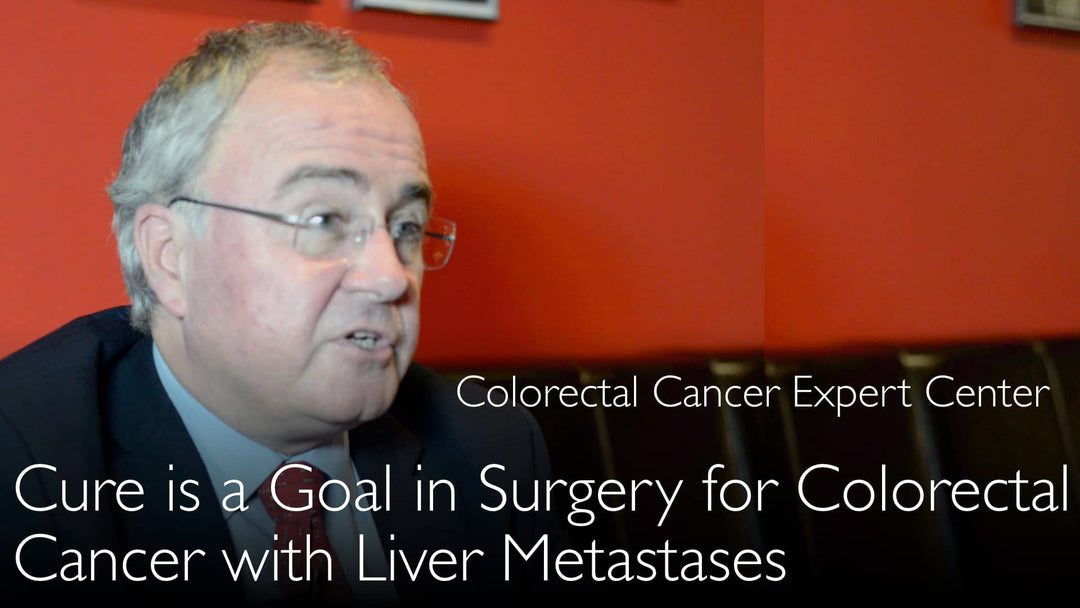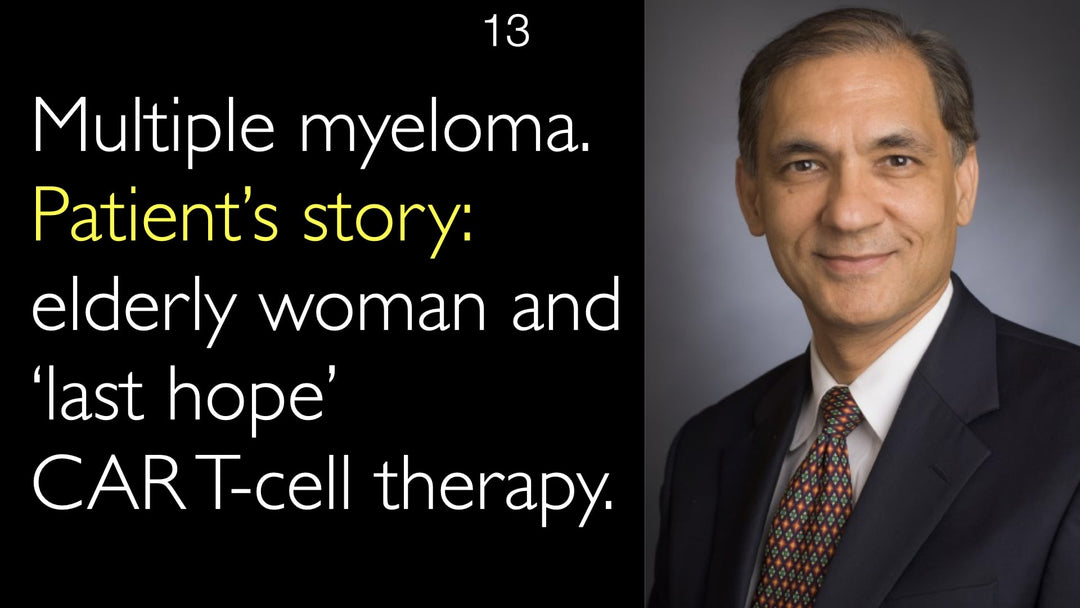Leading expert in colorectal cancer liver metastases, Dr. Graeme Poston, MD, explains how cure and long-term survival are now possible for stage 4 colon cancer. Treatment often begins with systemic chemotherapy to test tumor biology. A multidisciplinary team then plans a surgical strategy. Modern techniques like microwave ablation can destroy multiple liver tumors in a single operation. Five-year survival rates can reach 40% for selected patients.
Advanced Treatment Strategies for Colorectal Cancer Liver Metastases
Jump To Section
- Multidisciplinary Approach to Liver Metastases
- Systemic Chemotherapy as a First Step
- Surgical Resection Options for Liver Lesions
- Microwave Ablation Advances in Tumor Destruction
- Long-Term Survival Outcomes and Prognosis
- Full Transcript
Multidisciplinary Approach to Liver Metastases
Dr. Graeme Poston, MD, emphasizes that a multidisciplinary team is essential for treating stage 4 colorectal cancer with liver metastases. This collaborative approach ensures that all aspects of a patient's care are considered. The treatment strategy is complex and not straightforward, requiring input from medical oncologists, surgeons, and other specialists.
Dr. Anton Titov, MD, discusses the importance of this team-based model with Dr. Poston. The goal is to create a comprehensive and personalized treatment plan for each patient. This strategy maximizes the chance for a successful outcome, including potential cure.
Systemic Chemotherapy as a First Step
Treatment for metastatic colon cancer to the liver frequently begins with systemic chemotherapy. Dr. Graeme Poston, MD, explains that this initial phase serves as a critical test of tumor biology. The response to chemotherapy, such as the FOLFOX regimen containing Oxaliplatin, provides valuable prognostic information.
Dr. Graeme Poston, MD, notes that only about 6% of patients see their disease progress during the first six cycles of this chemotherapy. The vast majority of patients will either stabilize or respond. A positive response can sometimes convert initially unresectable liver lesions into operable ones, opening the door to curative strategies.
Surgical Resection Options for Liver Lesions
Once a patient responds to chemotherapy, surgeons like Dr. Graeme Poston, MD, evaluate the best method for removing the liver metastases. A single operation may be sufficient to resect all lesions. For more complex cases, a two-stage operation might be necessary, where each half of the liver is operated on in separate procedures.
Dr. Poston cautions that this two-stage strategy carries a significant risk. In approximately 25% of patients, the cancer progresses during the interval between the two surgeries. Another advanced technique is the ALPPS procedure, which shortens the time between operations to about a week. However, the ALPPS procedure itself carries a high operative mortality risk of around 10%.
Microwave Ablation Advances in Tumor Destruction
A modern technique adopted by experts like Dr. Graeme Poston, MD, is the "Chip and Burn" procedure. This involves surgically resecting some liver metastases while using ablation to destroy others. The field has moved from older radiofrequency ablation, which took 20 minutes per tumor, to modern microwave ablation.
Dr. Anton Titov, MD, confirms with Dr. Poston that microwave ablation can destroy a tumor in just two minutes. This efficiency allows surgeons to treat a patient with as many as 15 metastatic lesions in the liver in a single two-hour operation. A key requirement for successful ablation is that the metastases must be smaller than three centimeters in size.
Long-Term Survival Outcomes and Prognosis
Long-term survival and even cure are achievable goals for stage 4 colon cancer with liver metastases. Dr. Graeme Poston, MD, cites published data from his center and other leading institutions like Memorial Sloan Kettering. The research involved 300 patients who were initially considered inoperable and incurable.
After a good response to chemotherapy followed by surgery and ablation, the five-year survival rate for these patients was 40%. Dr. Graeme Poston, MD, notes that disease-free survival rates are lower, and many patients require multiple lines of therapy. However, multimodal treatment can keep patients alive for an average of three to four years, offering significant hope.
Full Transcript
Dr. Anton Titov, MD: Treatment of metastatic stage 4 colon cancer to the liver frequently involves starting with systemic chemotherapy. Surgery to resect the primary colorectal tumor may be last in the treatment plan.
Dr. Graeme Poston, MD: Because the response of metastatic colon cancer to systemic chemotherapy is the best tumor behavior test we have at the moment.
Dr. Anton Titov, MD: Comprehensive treatment strategy for colorectal cancer liver metastases includes "Chip and Burn", ALPPS procedure, and chemo-embolization. Colon cancer with liver metastases: long-term survival and cure is possible.
Dr. Graeme Poston, MD. Colorectal cancer liver metastases treatment by a multidisciplinary team. Cure of stage 4 colorectal cancer with liver metastatic lesions is possible. Advanced stage 4 colon cancer surgery for liver metastases: systemic chemotherapy tests the biology of colorectal cancer. ALPPS procedure for liver metastases resection.
Dr. Anton Titov, MD: Video interview with a leading British liver cancer surgeon specializing in colorectal cancer metastases resection. Five-year survival in stage 4 colon cancer with liver metastases is 40%. Liver metastases were resected and microwave ablation was used.
Medical second opinion confirms that a stage 4 colorectal cancer diagnosis is correct and complete. It also confirms that liver metastases surgery is possible in stage 4 colon cancer. Best treatment for advanced stage 4 colon cancer with liver metastatic lesions. Medical second opinion helps to choose the best treatment for stage 4 colorectal cancer with liver metastases.
Get a medical second opinion on advanced colorectal cancer and be confident that your treatment is the best. Best colorectal cancer treatment center for liver metastases. Video interview with a leading expert in colorectal cancer liver metastases treatment surgery. Advanced colon cancer cure. Surgical resection and radiofrequency ablation of liver metastatic stage 4 colon cancer.
Dr. Anton Titov, MD: Curative strategy for metastatic stage 4 colorectal cancer is possible today.
Dr. Graeme Poston, MD: Sometimes metastases are present in the liver. Several years ago, curing patients with stage 4 metastatic colon cancer was not possible. It can still be possible to surgically resect the lesions. Sometimes metastases are present in the liver and sometimes even in the lungs.
More patients with stage 4 metastatic colorectal cancer have long-term survival.
Dr. Anton Titov, MD: You are a leading surgeon for colorectal cancer and metastatic disease to the liver in particular. How do you make decisions about a curative strategy for stage 4 metastatic colorectal cancer? What affects your surgical strategy at the time of operation to remove metastatic liver lesions from colon cancer spread to the liver?
Dr. Graeme Poston, MD: This is really where multidisciplinary team working has to be done. The data shows this. For metastatic stage 4 colorectal cancer patients, the treatment strategy is not straightforward.
Dr. Anton Titov, MD: The treatment of metastatic stage 4 colon cancer to the liver frequently involves starting with systemic chemotherapy.
Dr. Graeme Poston, MD: Because how a stage 4 metastatic colon cancer tumor responds to systemic chemotherapy is a good test of tumor biology. Response of metastatic stage 4 colon cancer to systemic chemotherapy is the best tumor behavior test we have at the moment. Although it will be superseded by genetic tumor testing in the next five years.
But systemic chemotherapy allows us to see the result. We can get a response from a metastatic stage 4 colon cancer tumor. We know even with traditional cytotoxic chemotherapy, only 6% of patients will have metastatic stage 4 colon cancer tumor progress in the first six cycles. This is a treatment with Oxaliplatin. FOLFOX is the name of the chemotherapy regimen.
The majority of patients with metastatic stage 4 colon cancer will either stabilize or respond to systemic chemotherapy. First, we test the biology of the tumor. At that point, we hope we converted patients with liver metastases from stage 4 colon cancer. Unresectable liver lesions became resectable liver metastatic lesions.
We would then consider the liver metastases resection strategy. We might do a single surgical operation. It might require two separate surgical operations. We call that a two-stage operation. We resect liver metastases in one half of the liver first. Then we remove colon cancer metastases from the other half of the liver.
That has risks; that is a two-step strategy. Because unfortunately in 25% of patients, colon cancer progresses between the two stages of surgery.
Dr. Anton Titov, MD: There is another operation to resect multiple liver metastases. It is called the ALPPS procedure. In the ALPPS procedure, we bring the gap between the two surgical operations to a very short period of time. It is only about six or seven days.
Dr. Graeme Poston, MD: ALPPS procedure carries a significant risk of operative mortality. It is 10% mortality rates. We have adopted another operation to remove liver metastases. We call it "Chip and Burn".
We resect liver metastatic lesions from stage 4 colon cancer. We also ablate the tumors in the liver. We have now moved on from the old-fashioned radiofrequency ablation method. That would take 20 minutes to ablate liver tumors. We now use microwave ablation of cancer. This takes two minutes per tumor to destroy colorectal cancer metastases in the liver.
We could take a patient with 15 metastases in the liver. In one operation, we can purify that liver out of metastatic lesions in two hours. The metastases must be reduced in size to less than three centimeters.
Dr. Anton Titov, MD: 15 metastatic lesions in the liver from stage 4 colorectal cancer can be removed in two hours by the new microwave ablation method?
Dr. Graeme Poston, MD: Microwave ablation.
Dr. Anton Titov, MD: Microwave ablation.
Dr. Graeme Poston, MD: Yes. Yes.
Dr. Anton Titov, MD: Some metastatic stage 4 colon cancer patients have the "wild" KRAS and NRAS tumor type. As you discussed, they can basically stay disease-free for a long time?
Dr. Graeme Poston, MD: Yes, their prognosis will be very good. We have published the data. We published the data this year from my center and from Memorial Sloan Kettering, from Bordeaux in France, and Aarhus in Denmark. 300 patients with liver metastases from colorectal cancer had these characteristics.
Dr. Anton Titov, MD: These are patients who are completely inoperable, completely incurable at the start. These advanced stage 4 colon cancer patients had a very good response to chemotherapy first. Then we operated on these patients to remove their liver metastatic lesions.
Dr. Graeme Poston, MD: We resected and ablated liver metastases. Our five-year survival rate for those patients was 40%. The disease-free survival was a lot lower. Because these advanced stage 4 colon cancer patients have a poor prognosis.
We do multi-modal therapy to treat advanced stage 4 colon cancer and we do repeat lines of therapy. Then we can keep these patients alive on average three to four years.
Dr. Anton Titov, MD: Stage 4 colon cancer liver metastases. Treatment starts with systemic chemotherapy followed by surgery and tumor ablation. Long-term survival or cure in colon cancer with liver metastases is possible.








